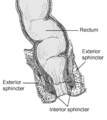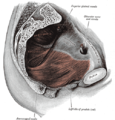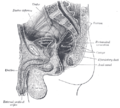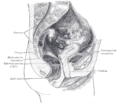Anal canal
| Anal canal | |
|---|---|
 Coronal section of rectum and anal canal. | |
 Coronal section through the anal canal. B. Cavity of urinary bladder V.D. Ductus deferens. S.V. Seminal vesicle. R. Second part of rectum. A.C. Anal canal. L.A. Levator ani. I.S. Sphincter ani internus. E.S. Sphinear ani externus. | |
| Details | |
| Precursor | hindgut, proctodeum |
| Artery | inferior rectal artery |
| Vein | inferior rectal vein |
| Lymph | superficial inguinal lymph node (below pectinate line) internal iliac lymph nodes (above line) |
| Identifiers | |
| Latin | canalis analis |
| MeSH | D001003 |
| TA98 | A05.7.05.001 |
| TA2 | 3009 |
| FMA | 15703 |
| Anatomical terminology | |
The anal canal is the terminal part of the large intestine.[1]
It is situated between the rectum and anus,[2] below the level of the pelvic diaphragm. It lies in the anal triangle of perineum in between the right and left ischiorectal fossae.
The anal canal is divided into three parts. The zona columnaris is the upper half of the canal and is lined by simple columnar epithelium. The lower half of the anal canal, below the pectinate line, is divided into two zones separated by Hilton's white line. The two parts are the zona hemorrhagica and zona cutanea, lined by stratified squamous non-keratinized and stratified squamous keratinized, respectively.
In humans it is approximately 2.5 to 4 cm long, extending from the anorectal junction to the anus. It is directed downwards and backwards. It is surrounded by inner involuntary and outer voluntary sphincters which keep the lumen closed in the form of an anteroposterior slit.
It is differentiated from the rectum by the transition of the internal surface from endodermal to skinlike ectodermal tissue.
Upper and Lower Divisions
The anal canal is divided into two unequal sections, upper and lower.
- The upper 2/3 has longitudinal folds or elevations of tunica mucosa. Its mucosa is lined by simple columnar epithelium. Its lower ends are joined together by folds of mucus membrane called anal valves. The upper 2/3 of the anal canal is supplied by the superior rectal artery which is a branch of the inferior mesenteric artery.
- The lower 1/3 of the anal canal is lined by stratified squamous epithelium that blends with the skin. The lower third of the anal canal is supplied by the inferior rectal artery which is a branch of the internal pudendal artery.
A whitish line called Hilton's white line indicates the junction between keratinized stratified squamous epithelium and unkeratinized stratified squamous epithelium.
Surgical spaces related to the anal canal
- The ischiorectal fossa lies on each side of the anal canal.
- The perianal space surrounds the anal canal below the white line.
- The submucous space of the canal lies above the white line between the mucous membrane and internal anal sphincter muscle.
Additional images
-
Anatomy of the anus and rectum
-
Left Levator ani from within.
-
The interior of the anal cami and lower part of the rectum.
-
Median sagittal section of male pelvis.
-
Median sagittal section of female pelvis.
See also
References
- ^ Anal+Canal at the U.S. National Library of Medicine Medical Subject Headings (MeSH)
- ^ "anal canal" at Dorland's Medical Dictionary
External links
- pelvis at The Anatomy Lesson by Wesley Norman (Georgetown University)
- Anatomy figure: 44:05-00 at Human Anatomy Online, SUNY Downstate Medical Center - "The rectum and anal canal in the male pelvis."
- Template:EMedicineDictionary





